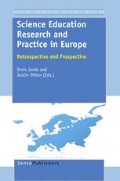Abstract
The aim of this chapter is to discuss video studies and new ways of coding, and how coding categories and levels of analyses perform as analytical tools when analysing teaching and learning in science classrooms. Through in-depth analyses of video data from lower secondary science classrooms, we show how different categories and levels of analyses support diversified interpretations and conclusions. By moving between different categories with different levels of functioning, we show how conclusions arrived on the basis of one level of coding might be scrutinized, and challenged, if you use another level of coding as the basis for making interpretations of the data. Within studies of teaching and learning, we argue that scholars often tend to give preference to some authoritative levels or analytic categories in favour of others (often macro level analysis), without any explicit criteria and rationale for these preferences (Nespor, 2004; 2000). In the following analyses, we will elaborate on conceptual categories and functioning levels as lenses through which we explore and analyze teaching and learning opportunities in science classrooms.
Access this chapter
Tax calculation will be finalised at checkout
Purchases are for personal use only
Preview
Unable to display preview. Download preview PDF.
References
Alexander R. Culture & Pedagogy. Malden: Blackwell Publishing; 2000.
Alexander R. Education as Dialogue: moral and pedagogical choices for a runaway world. Hong Kong: Hong Kong Institute of Education in conjunction with Dialogos; 2006.
Arnesen, N. E., & Ødegaard, M. (2006). Categories for video analysis of science classroom activities. Oslo: University of Oslo.
Aukrust, V. G. (2003). Samtaledeltakelse i norske klasserom - en studie av deltakerstrukturer og samtalebevegelser. In K. Klette (Ed.), Klasserommets praksisformer etter Reform 97. Synteserapport. Oslo: Pedagogisk forskningsinstitutt.
Bakhtin, M. (1953/1980). The Dialogic Imagination. Austin, TX: University of Texas Press.
Barnes D, Britton J, Rosen H. Language, the Learner and the School. Harmondsworth: Penguin; 1969.
Bergem, O. K. (2009). Individuelle versus kollektive arbeidsformer. En drøfting av aktuelle utfordringer i matematikkundervisningen i grunnskolen. [Individual versus collective work. A discussion of current challenges in mathematics teaching in lower secondary classrooms]. Ph.D. thesis, University of Oslo, Oslo.
Cuban L. How teachers taught: Constancy and change in American classrooms 1880–1990. New York: Teachers College Press; 1993.
Driver R. The Pupil as Scientist? New York: Taylor and Francis, Inc.; 1983.
Dysthe, O. (1995). Det flerstemmige klasserommet.[The multivoiced classroom] Oslo: Ad Notam/Gyldendal.
Edwards D, Mercer N. Common knowledge: The development of understanding in the classroom. London: Methuen; 1987.
Emanuelsson J, Sahlström F. The price of participation: Teacher control versus student participation in classroom interaction. Scandinavian Journal of Educational Research. 2008;52(2):205–223.
Galton M, Hargreaves L, Comber C, Pell T, Wall D. Inside the Primary Classroom: 20 Years On. London: Routledge; 1999.
Goodlad J. A place called school. New York: McGraw-Hill; 1984.
Jorde P. Early Childhood Education: Issues and Trends. The Educational Forum. 1986;50(2):171–181.
Juzwik MM, Nystrand M, Kelly S, Sherry MB. Oral narrative genres as dialogic resources for classroom literature study: A contextualized case study. American Educational Research Journal. 2008;45(4):1111–1155.
Klette K. Challenges in Strategies for Complexity Reduction in Video Studies. Experiences from the PISA + Study: A Video Study of Teaching and Learning in Norway. In: Seidel TJT, editor. The power of videostudies. Berlin: Waxmann Publishing; 2009.
Klette, K. (2010). Blindness to change during processes of change: What do educational researchers learn from classroom studies?. In A. L. A. Hargreaves, and M. Fullan (Ed.), Second International Handbook of Educational Change: Springer.
Klette, K. (Ed.). (2003). Klasserommets praksisformer etter Reform 97. Synteserapport. Oslo: Pedagogisk forskningsinstitutt.
Klette K, Lie S, Anmarkrud Ø, Arnesen N, Bergem OK, Ødegaard M, et al. Categories for video analysis of classroom activities with a focus on the teacher. Oslo: University of Oslo; 2005.
Klette, K., Lie, S., Ødegaard, M., Anmarkrud, Ø., Arnesen, N., Bergem, O. K., et al. (2008). Rapport om forskningsprosjektet PISA+ (Pluss: Prosjekt om Pörings- og Undervisnings-Strategier i Skole). Oslo.
Lemke, J. (1990). Talking Science. Language, learning and values. Norwood, NJ: Ablex Publishing.
Lemke J. Across the Scales of Time: Artifacts, Activities, and Meanings in Ecosocial Systems. Mind, Culture, and Activity. 2000;7(4):273–290.
Lie S, Kjærnsli M, Roe A, Turmo A. Godt rustet for framtida? Norske 15-åringers kompetanse i lesing og realfag i et internasjonalt perspektiv. Oslo: Institutt for lærerutdanning og skoleutvikling, Universitetet i Oslo; 2001.
Mortimer E, Scott P. Meaning Making in Secondary Science Classrooms. Maidenhead: Open University Press; 2003.
Nespor J. Educational scale-making. Pedagogy, Culture and Society. 2004;12(3):309–326.
Nystrand, M. (1997). Opening dialogue : understanding the dynamics of language and learning in the English classroom New York: Teachers College Press.
Ogborn J, Kress G, Martins I, McGillicuddy K. Explaining Science in the Classroom. Buckingham: Open University Press; 1996.
Popkewitz T. Educational knowledge: Changing relationships between the state, civil society, and the educational community. Albany, N.Y.: State University of New York Press; 2000.
Sahlström, F. (1999). Up the hill backwards: On interactional constraints and affordances for equity-constitution in the classrooms of the Swedish comprehensive school. Uppsala universitet, Humanistisk-samhällsvetenskapliga vetenskapsområdet, Samhällsvetenskapliga fakulteten, Pedagogiska institutionen, Uppsala.
Vygotsky. (1978). Mind in Society. Cambridge, Massachusetts: Harvard University Press.
Wellington, J., & Osborne, J. (2001). Language and Literacy in Science Education. Buckingham Open University Press.
Wells G. Language, Learning and Education. Windsor, UK: NFER-Nelson; 1985.
Wertsch J. Voices of the mind. Cambridge, Mass: Harvard University Press; 1991.
Ødegaard, M., & Arnesen, N. E. (2010). Hva skjer i naturfagklasserommet? ~ resultater fra en videobasert klasseromsstudie; PISA+. NorDiNa, 6 (1).
Author information
Authors and Affiliations
Editor information
Editors and Affiliations
Rights and permissions
Copyright information
© 2012 Sense Publishers
About this chapter
Cite this chapter
Ødegaard, M., Klette, K. (2012). Teaching Activities and Language use in Science Classrooms. In: Jorde, D., Dillon, J. (eds) Science Education Research and Practice in Europe. Cultural Perpectives in Science Education, vol 5. SensePublishers, Rotterdam. https://doi.org/10.1007/978-94-6091-900-8_8
Download citation
DOI: https://doi.org/10.1007/978-94-6091-900-8_8
Publisher Name: SensePublishers, Rotterdam
Online ISBN: 978-94-6091-900-8
eBook Packages: Humanities, Social Sciences and LawEducation (R0)

